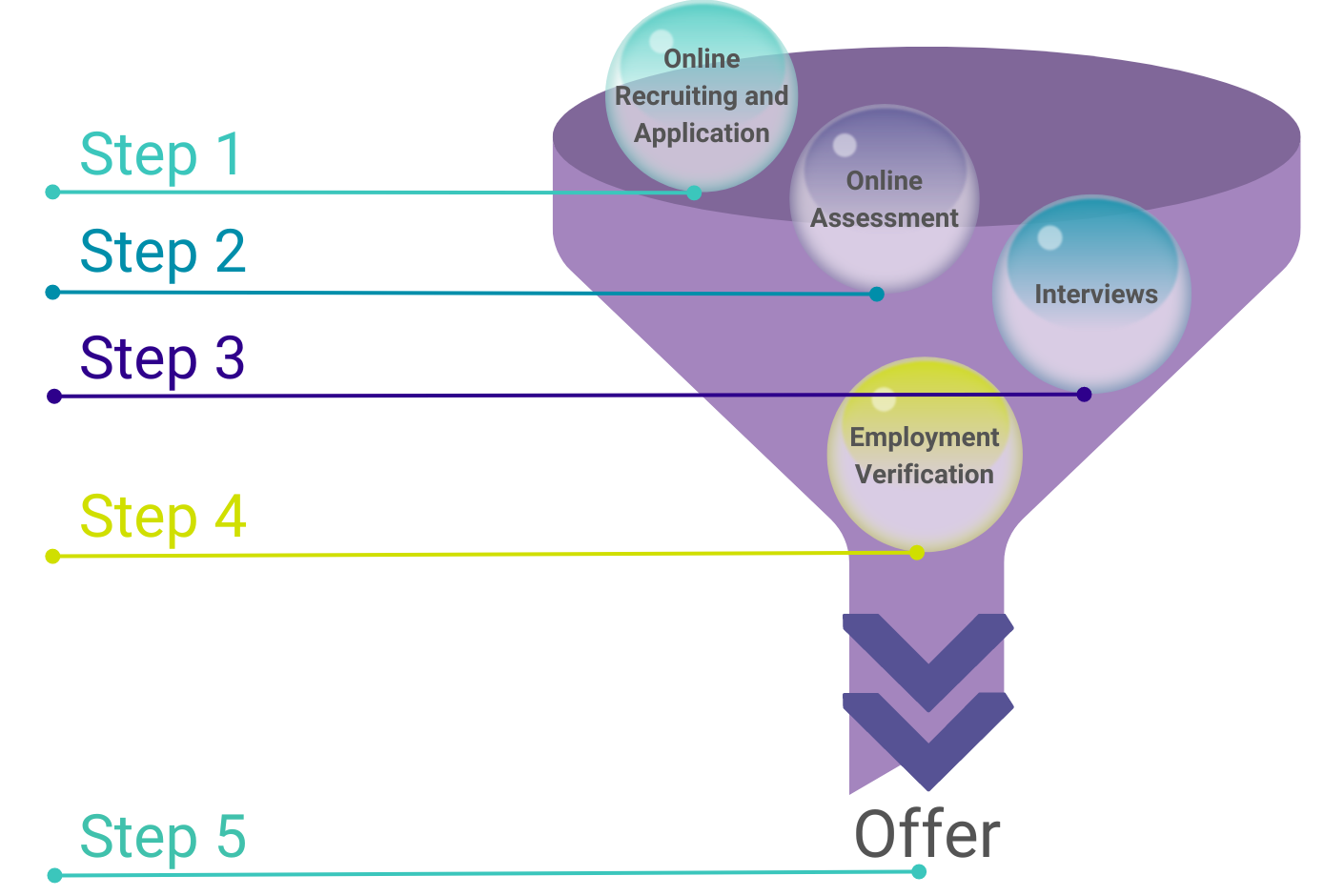An article on the front page of The Wall Street Journal, Today’s Personality Tests Raise the Bar for Job Seekers, reviewed the use of personality assessments in hiring and its effects on the selection process. The WSJ has a tenured readership with most actively engaged in driving businesses forward. This made us think the comments on the article would provide a valuable glimpse at how business leaders view personality hiring assessments. Walk with us through the most common myths that emerged in the 200 plus comments on the article as we compare perception to the science and practice of selection and assessment.
Myth: hiring assessment tests allow companies to discriminate based on age, race, and other protected classes.
To the contrary, one of the reasons for using personality tests is to avoid discrimination based on protected classes, or any characteristic that isn’t related to performing the job. In fact, the Equal Employment Opportunity Commission (EEOC) requires that assessment developers evaluate and monitor personality assessments to ensure that they do not select a disproportionate number of any one type of group (whether it be age, race, or any other protected class). If the personality test discriminates based on those characteristics, it is illegal to use it.

Unsplash+ In collaboration with Getty Images
Personality tests actually reduce the chance for illegal discrimination by focusing only on those personality characteristics which are related to successful job performance. Unlike people, they don’t suffer from biases or prejudice. The assessment doesn’t know or care what age or race you are when calculating the results, and it doesn’t provide the hiring manager with any information about those characteristics either. It serves as an unbiased source of information about the candidate’s fit for the job that further informs the hiring manager’s overall decision.
Myth: It's better to simply find someone with job-related experience than use testing.
Unfortunately, it’s difficult to know what work experience will yield success on the job, or find enough candidates with experience that closely matches your unique standards for performance. Further, with entry-level jobs, or high potential candidates switching to a new career, experience may not be available. Without that information, it makes it even more difficult to understand if someone is likely to be a strong performer. Personality assessments are especially useful in this context because they provide insight into whether the person can do the job, even though they have never done it before.
Even when work experience is available, personality assessments can provide powerful information. It is entirely possible for a person with experience elsewhere to fail miserably at the same job when presented with your organization’s culture or standards. Personality assessments can be designed to fit your culture and standards and don’t assume performance elsewhere is the same as at your organization.
Interestingly, the “fit” part of the above statement is what personality testing is primarily about. While they can inform the “what” of the job (how well a person can do the activities expected for the job), they are especially good at tapping into the “how” of the job (the way a person goes about doing the activity). For example, a tax preparer can do all the tasks required to process a customer (the “what”), but the person that has the right personality for it (the “how”), will do it with enthusiasm and care, and ultimately, will do it in a way that leaves the customer not just with an accurately completed tax return, but with a positive feeling about the experience and company. As a result, determining “fit” for a job is exactly how personality testing can help.
Myth: References are better than assessment testing.

Of the hundreds of different hiring managers we have met over the years, a minute amount would agree with this statement. In fact, we most often hear that references aren’t useful or have very limited use. There are multiple reasons for this, but here are the top four:
- Most Organizations Will Only Provide Dates of Employment, Position Held, and Pay upon Separation: When providing references, legal liability/risk falls on the organization providing the information, so many organizations only provide objective information that is required to verify employment. As a result, references don’t usually provide much information.
- It Is Difficult to Trust the Information: In the instances that a reference is willing to provide detail about an individual’s employment, they rarely will provide negative information to avoid burning bridges or hurting someone that they used to know and is out of work. It is also frequently possible for poor performers to find someone they worked with previously that is willing to give a good review. Rarely will someone fail to be able to come up with at least one fairly good referral.
- They Are Very Time Intensive: Calling references simply takes a lot of time. It means finding time during normal office hours to have the call, it typically means dealing with extended sessions of phone tag and scheduling, and the conversation itself takes more time than many other screening methods. This means it is highly unusual for an organization to use it as a sole screening device – they just don’t have the resources to make the calls and even if they did, it is a waste of time/money to do them when cheaper and easier methods are available. Most organizations treat references as a final “check,” rather than a way to screen, necessitating tools like personality assessments to cull the list of candidates.
- Not Everyone Has Work Experience: If a candidate doesn’t have work experience, a referral isn’t possible. As a result, any entry-level position cannot heavily or solely rely on references to make hiring decisions, it just isn’t practical.
As a result, personality assessments can be very useful because they do not suffer from any of these negative attributes. They can be administered quickly, are very reliable, don’t require work experience, and offer great insight into how well a person is likely to fit with the organization and position.
“Don’t test me, bro.”
This was an actual quote from the comments, a clever play off the “don’t tase me” line. Numerous WSJ readers wrote that they’ve refused, or would refuse, to take a personality test for a position. This was largely based on the misguided beliefs we’ve reviewed that personality tests are inaccurate and don’t provide an opportunity for a candidate to showcase their true talent. Personality tests create a more efficient process for organizations and candidates. All Corvirtus assessments are validated and evidence based. This means candidates hired with the assessment are markedly more likely to have a positive work experience with greater performance, fit with culture, and longer tenure. We often focus on the benefits of hiring assessments for corporate performance when they also benefit candidates by placing them in work environments where they can flourish.
Myth: Hiring assessment tools don't predict performance.

Unsplash+ In collaboration with Andrej Lišakov
How many times have you interviewed a candidate, without the use of an assessment, who has not succeeded on the job? Or hired a candidate based on their experience on the resume, but then they demonstrate less than stellar performance at work? How many times did you want to completely throw out interviewing or resume reviews based on those mistakes?
“I’ve had many candidates that pass with flying colors, but fail at the job.”
However, when an assessment is used and a candidate fails at the job, it’s a quick and easy thing to blame something tangible (the test) rather than spend some time slowing down and analyzing your hiring and onboarding process. If you find yourself hiring people who are rock stars on the assessments, but fail to meet expectations on the job, you may want to ask yourself the following questions:
1. Am I measuring the things that are most needed for success and the things I value?
Make sure you are really measuring the things that are most critical and needed for success – not just the technical skills, but the right attitudes and work behaviors as well.
2. Do I fully understand what the assessment information is telling me, and what it’s not?
Not understanding what an assessment is and how it works leads to skepticism that the results are not accurate and effective. Take time to understand the powerful information it can give you. Also, if a new hire fails because of lack of motivation, don’t blame a test that is measuring dependability!
3. Is this new hire getting the tools and support needed for success?
Bringing on a new hire and not setting them up for success by providing them with the formal or informal training, support, and feedback they so critically need in the beginning will ensure you are making it as easy as possible for them to fail.
4. Did I select for appropriate fit into the culture and work environment?
It’s unrealistic to think that just because you give candidates an assessment it will make up for bringing them into an environment where they do not fit. They will fail.
Overall, assessments, much like resumes or interviews, are not foolproof, but they do drastically increase your odds of finding the best candidates, better than anything else you can do in the hiring process; if you take the little bit of extra time in the beginning to do it right.
"When hiring engineering talent you can't fool around with personality tests. When you find an engineer with strong technical and communication skills you have to hire them. The pool is too small."
Hiring engineering talent without personality tests and solely on technical skill is what you don’t want to fool around with! Engineering skills are highly sought after, and yes, candidate pools can be very small, but wouldn’t you want to take that small pool of technically brilliant engineers and hone in on the ones that also exhibit the behaviors that get the job done the best? How they work with others, how they learn, plan, or adapt to change?

Photo by Towfiqu barbhuiya on Unsplash
Let’s say you are hiring for an Energy Resource Planning Principal Engineer in the oil and gas industry. Yes, this person must be able to perform highly specialized engineering duties, manage critical engineering projects, possess their engineering degree, and have the skills needed to perform complex analyses. However, those technical skills are “price of admission” stuff – you must possess those to get in the door. Those highly specialized skills won’t tell you “how” this person would get those tasks done, and we know that “how” work gets done is as important as “what” get done.
The key is to create a solid funnel. This often begins with first screening out applicants that do not meet clear and easily verified job requirements. Then, personality and other hiring assessments can be administered on your smaller pool. This comes before the most time-intensive part of the process: the interview.

This approach allows you to marry experience with the assessment before the interview thereby enriching your time with the candidate. The key is to start with your competencies and job requirements first before selecting predictive assessments and screens to support your hiring funnel. Do that correctly and a few candidates that will best fit with your team and your organization will surely stand out. Remember, we tend to hire for technical skill and experience and terminate for culture and 'soft skill.' Last but not least...
Hiring assessments are useful to learn how to work with people, but using them for hiring decisions is extreme.
Hiring is a game of odds. It’s about strategy and chance, and increasing our odds by using tools that provide information you cannot get in any other part of the hiring process is smart and sound. Adding appropriate personality testing to your hiring repertoire at the correct time is an incredibly useful practice that gives you information on behaviors that are drivers of performance.
First identify your hiring priorities by listing those attitudes and behaviors that an ideal candidate must be able to demonstrate on-the-job to be successful. Then match those to what a candidate demonstrates on a well-developed personality assessment (yes, there are many out there that are not). This method is a sure-fire way to increase those odds.





